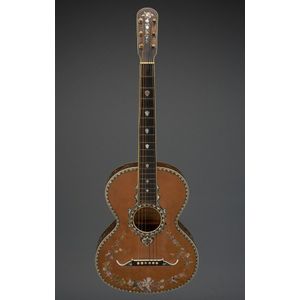Romantic Italian Guitar with Mother-of-Pearl Inlay
You must be a subscriber, and be logged in to view price and dealer details.
Subscribe Now to view actual auction price for this item
When you subscribe, you have the option of setting the currency in which to display prices to $Au, $US, $NZ or Stg.
- Armorial / Armourial - Bearing a coat of arms. Coats of arms came into general use by feudal lords and knights in in the 12th century, and by the 13th century, arms had spread beyond their initial battlefield use to become a flag or emblem for families in the higher social classes of Europe. They were inherited from one generation to the next. When a family crest is used on individual items of silver or furniture it is an indicator of the aristocratic standing of the family represented.
Armorials were also used to decorate mass produced ceramic souvenir ware by such companies as Goss, Carlton & Shelley, and in these cases the coats of arms displayed were of boroughs and cities. - Circa - A Latin term meaning 'about', often used in the antique trade to give an approximate date for the piece, usually considered to be five years on either side of the circa year. Thus, circa 1900 means the piece was made about 1900, probably between 1895 and 1905. The expression is sometimes abbreviated to c.1900.
- Mother-Of-Pearl - Mother-of-pearl, technical name "nacre", is the inner layer of a sea shell. The iridescent colours and strength of this material were widely used in the nineteenth century as an inlay in jewellery, furniture, (especially papier mache furniture) and musical instruments.
In the early 1900s it was used to make pearl buttons. Mother-of-pearl is a soft material that is easily cut or engraved.
Nowadays it is a by-product of the oyster, freshwater pearl mussel and abalone industries. - Floral Swag / Garland / Festoon - Floral swags are a decorative motif often used in the ornamentation of various objects, such as silverware, glassware, and furniture. The term "swag" refers to a garland or wreath of flowers, foliage, or other decorative elements, which is usually arranged in a loop or curve.
Floral swags can be found in a variety of decorative styles, from ornate Baroque and Rococo designs to more naturalistic Art Nouveau and Art Deco styles. They are often used to add a touch of elegance, refinement, or whimsy to an object, and can be seen on a range of items from chandeliers and candlesticks to picture frames and tea sets.
In the decoration of silver objects, floral swags are often used to accentuate the curves and lines of the piece, and to add visual interest to the surface. Similarly, on glass objects, floral swags may be used to frame or highlight a particular area of the object, or to add a touch of color and delicacy.
On furniture, floral swags can be found on a variety of pieces, from cabinets and armoires to chairs and sofas. They are often used to enhance the lines and curves of the furniture, and can be used to create a sense of movement and flow in the design.
Overall, floral swags are a versatile decorative element that can be adapted to a range of styles and applications, and have been used in the decoration of various objects throughout history.
This item has been included into following indexes:
Visually similar items

A 19th century Meissen porcelain figure, of a woman in 18th century dress playing a spinet, blue crossed swords mark, impressed numbers and incised marks. Height 12 cm

An Art Deco spelter dog group, circa 1920s, elegant collared hounds one standing and one seated, with their necks affectionately crossed, raised on a portoro marble base faced with tan marble, height 22 cm, width 28.5 cm, depth 11 cm

A late Victorian embossed silver handled and ivory long page turner, the parallel sided ivory blade with small chippings to the curved end, the leaf, floral and scroll handle with small loss, glue evident at fitting. Birmingham 1892. Length 42.5 cm

A Swedish Art Deco vase, by Rorstrand, circa 1930s, with stylized elephant motifs, factory mark to base, 13.5 cm high
